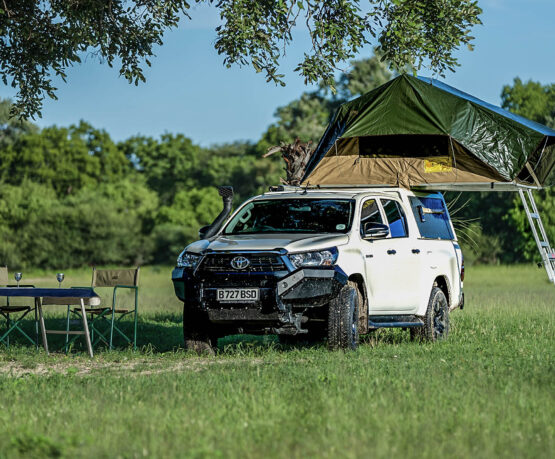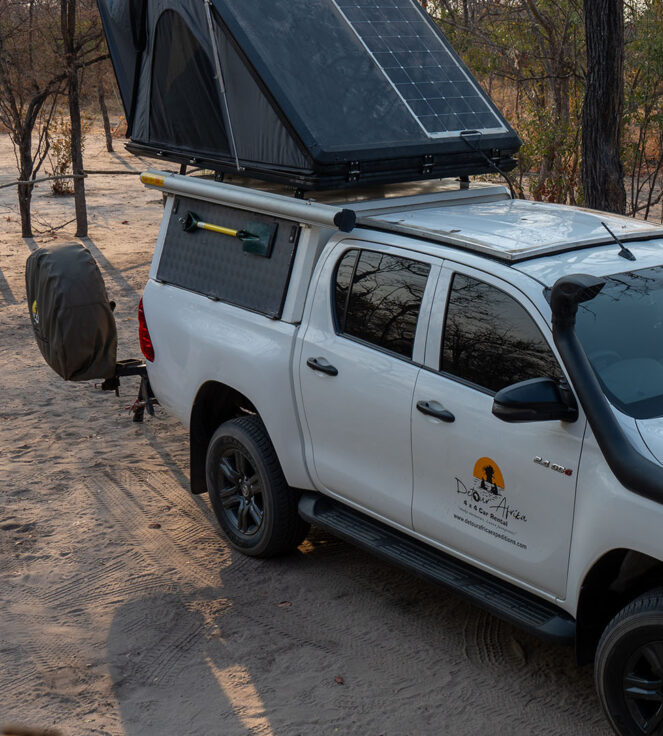Dream, Explore the Tranquility
Self Drives 4X4 Fully Equipped Camping
Hilux Double Cab (2-4 Pax)
From Price : $ 150-210 per day
A contemporary, four-seater 4X4 with one rooftop tent that's perfect for a couple. A camping car side awning shelter and a roof pop up for game viewing
. Fridge
. Gas Cooker
. Tent
. Bed
. Interior Bed
. Fuel Consumption (12L per 100 km)





A camping Expedition
The self-drive 4x4 fully equipped camping expedition have been the most affordable and popular as one travels at their own pace, travel for many days as they explore and experience the beautiful flora and fauna of Africa.
Despite the flexibility of it, one will need a proper road plan and a well-organized itinerary since most of the roads are inside the National Parks and mostly driving on remote areas with no network coverage ,thick sand, muddy, gravel or deep water roads hence slower driving and it’s a MUST & IMPORTANT for one to make sure all is set before departure.
This is where our friendly Detour Africa Expedition’s team comes to organize all for you with their experience.
Camping Rules
Embarking on a camping trip in Botswana requires a good deal of planning and preparation. You will be going to remote areas, accessible only by four-wheel drive mostly, where water, petrol or food may not be available. You may often be driving on rough terrain and through heavy sand in conditions very different from those you are used to.
What you Should Pack
As a general rule one should pack all food requirements to last your stay. Take at least 20 liters of water per person, preferably more. For desert destinations carry between 50 and 100 liters. Carry at least 100 liters of petrol in long-range tanks or in metal jerrycans and take spare vehicle parts for breakdowns.
As campsites within game reserves and national parks are usually not fenced, it is important for campers to take necessary precautionary measures to ensure their safety, and to abide by the information provided by wildlife officers.
Camping Rules
The following basic camping rules should be strictly adhered to:
- Always sleep in your tent, roof tent or vehicle. Make sure your tent zips up well.
- Don’t sleep with legs or arms protruding from the tent.
- Use rubbish receptacles at the campsites; if there are none, carry away all rubbish until you get to the next town.
- Cigarette butts should be well extinguished and placed in a rubbish bag, not thrown on the ground.
- Make sure the campfire is well extinguished at the end of the evening, or after use, and cover it with sand.
- Don’t sleep on bridges or animal paths, particularly those of elephants and hippos.
- Bury all fecal matter and burn all toilet paper.
- Don’t bathe or drink from still bodies of water; there is the danger of bilharzia.
- In the Okavango, don’t swim in lagoons or streams; there is the danger of crocodiles and/or hippos.
- Children must be constantly supervised. Never leave them alone in the campsite. Never allow children to nap on the ground or in the open.
- Don’t stray far from the campsite or walk in the bush, unless with a qualified guide.
- Driving is on the left side of the road. The national speed limit on tarred roads is 120 km/h and 60 km/h in towns and villages. Watch out for wildlife and domestic animals on the roads. In the National parks always stay on the established tracks in order to avoid the ugly scars left by off-road driving. Stay below the 40km/h speed limit for the safety of wildlife and yourselves.



Africa is wild, captivating, and waiting for you.
Let us take the reins, organizing every aspect, while you simply embrace the journey. Your safari adventure starts here – with us, your trusted partners in making dreams come true.
